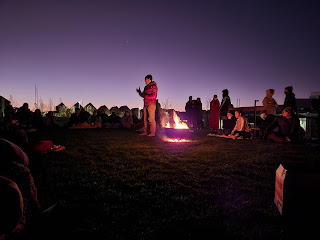In my previous post I focused on the view that the number one principle seems to be that effective schools have clearly articulated and shared beliefs about learning that are lived in every classroom.
This post proposes that the clearly articulated and shared beliefs about learning that are lived in every classroom need to be driven by a vision and mission which are deeply informed by new contexts for learning. In the previous post I stated that, in the end, it doesn't matter what the core beliefs about learning are but that it was vital that they were lived in every classroom. But, of course, it does matter.
If we start, as we should, with the question:
- "How do children and adults learn most powerfully and deeply in their lives?" (Modern Learners).
and we add:- "When they leave us, what will our students need to be able to do, and what kind of people will they be?" (Modern Learners)
and we take into account the rapidly changing and threatened world in store for our current learners (climate crisis, pandemics, increasing inequity, war, biodiversity threat, AI, world of work), we must explore, embrace and fully incorporate in our design of schools and of learning new ways in which we can learn and become educated.
These new ways of learning which will better prepare our ākonga for the realities of their fast-changing world need to be central and visible in a compelling narrative of what the school stands for and the principles that guide it.
Charles Leadbetter in Learning on Purpose (Centre for Strategic Action) says, " A compelling narrative has to convey both purpose and possibility, it speaks to identity (who you are, where you've come from and what you stand for) and intent (where you are going, what you want to achieve)." He also talks of the importance of being able to tell a coherent story about yourself. "with an arc into the future."
He describes a process to follow to establish the compelling narrative:
- clearly identify the dominant narrative which you wish to challenge and "how it disables you from making change and what its weaknesses are, how it does not add up."
- settle on a metaphor to build the narrative around. But make sure this reflects the new narrative (eg rather than competing, getting best scores etc more relevant metaphors might be around a growth in important dispositions that better prepare young people to flourish in the realities of the modern world.)
- contextualise the narrative and metaphor to your current setting and propose new structures to support the narrative.
- show what the way ahead looks like and the likely ways of navigating through
- focus on the narrative being invitational so that it becomes compelling to be part of
In thinking about the new contexts for learning that should be driving our vision and mission and be central to our new compelling narrative I'd like to highlight Michael Fullan (quoting Hargreaves and O'Connor) in The Right Drivers For Whole System Success (Centre for Strategic Education) who identifies "collaboration embedded in the culture and life of the school," as a key factor in effective schools.
Another useful framework to assist with a new narrative for schools and learning is that described by the Centre for Educational Research and Innovation (OECD) with their 7 Principles of Learning.
- Learners at the centre
- Social nature of learning
- Emotions are integral to learning
- Recognising individual differences
- Stretching all students
- Assessment for learning
- Building horizontal connections
As well, in one of their Horizon Reports NMC looking at future trends to develop deeper learning identifies project-based learning and inquiry learning as effective pedagogical approaches for deeper learning.
The Innovation Unit in the UK encourages schools wanting to be more effective to personalise learning, connect learning to the outside world, adopt a version of project-based learning, develop approaches that have students doing the teaching and inviting students into the learning design process.
Developing a compelling new narrative for your school, especially one that is fully informed by new contexts for learning (collaboration, connected, co-constructed), could be demanding work, but it is also rewarding and exciting work.
We know what makes for deep learning. The next step is to capture that in a compelling narrative for our school.
I'm happy to help.


No comments:
Post a Comment